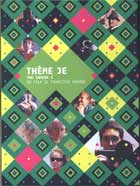
Thème Je / The Camera I 2011
Distributed by Microcinema International/Microcinema DVD, 2169 Folsom Street, Suite M101, San Francisco, CA 94110; 415-447-9750
Producer n/a
Directed by Françoise Romand
DVD , color and b&w, 129 min.
College - General Adult
Film Studies, Women’s Studies, Media Studies
Date Entered: 03/14/2012
Reviewed by Oksana Dykyj, Head, Visual Media Resources, Concordia University, MontrealFrançoise Romand’s seminal work The Camera I adds some newer footage to her 2004 opus creating a unique and engaging film about personal history related to film history. It is a reflexive film on both the personal level and on the level of art about art or film about film.
As an autobiography, it mixes interviews with family members and musings about the implications of one’s place in history and within the history of film. It probes and reveals with precision its specific narratives. Just like historical early documentary included fictional or fictionalized elements, Romand cleverly adds questionable scenes into her film, scenes which may or may not be fiction. Additionally, the titles are plays on words. In the French title she not only alludes to the “theme” being “I”, but the “theme” also has homonymic implications: it sounds just like “t’aime” which translates as “love you”. In English it’s clear that the “I” is the eye of the filmmaker and that it ultimately resolves with an acceptance and self-love, the Theme Je becomes Je t’aime.
She delves into her own career as filmmaker with references to her earlier and better known films Call me Madame (1987) and Mix-Up (1986) while spending time as a visiting lecturer at Harvard. She also reflects on her relationships with men over a 10-year period from 1999 to 2011. The intermingling of the various narratives creates a multi-faceted exposition of a life, its sexuality and intellectual side. In an early section of the film dealing mostly with her family, she uses quadrants and sections off the various images of her family members and their menagerie of pets. The sub-titles option allows for these to be placed in interesting places within the various tableaux presented and thus create an added layer of texture in the collage of images.
A bonus 22-minute film is added: Renconres (Intersections). It is Romand’s first film, completed in 1977 as part of her studies at the IDHEC (Institut des hautres études cinématographiques), one of the most celebrated film schools in France. The film features her sister Anny, who appeared in The Camera I, and deals with notions of art and representation.
This DVD is highly recommended for its imaginative and introspective take on autobiography and history. Françoise Romand’s career is bookended by her first and current films, thus adding to the theme about “I”. This film contains some full-frontal male and female nudity and sexual situations.